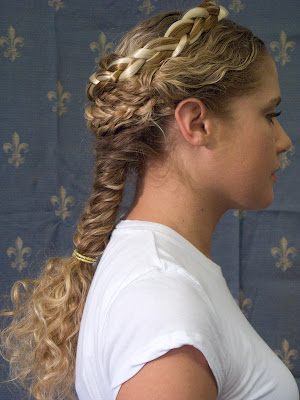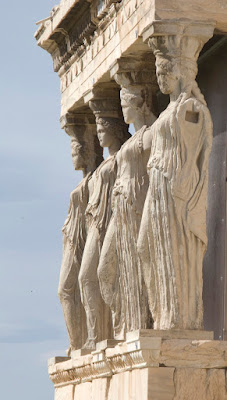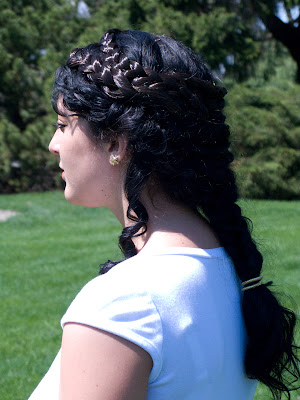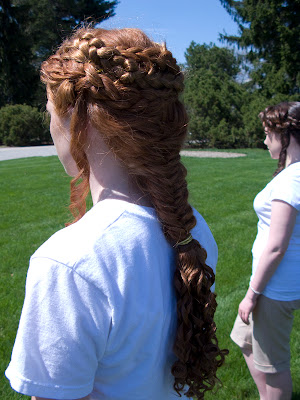
In the New Acropolis Mus
 eum, Athens --which was just built a few years ago -- one can see the statues from the back with their beautiful long braids of hair, falling in fishtails followed by more curls. In fact, the hair of the statues is in better condition than the faces and bodies whose arms are completely missing. (Caryatid is the name given to a feminine statue which acts as a column to hold up a building; Kore is a statue of a maiden.)
eum, Athens --which was just built a few years ago -- one can see the statues from the back with their beautiful long braids of hair, falling in fishtails followed by more curls. In fact, the hair of the statues is in better condition than the faces and bodies whose arms are completely missing. (Caryatid is the name given to a feminine statue which acts as a column to hold up a building; Kore is a statue of a maiden.)These six caryatids are
labeled Kore A - Kore F.
Every hairstyle is a bit different. Most have fishtail braids down the back, along with regular braids wrapped around the head. Some of the caryatids have sidecurls, while others do not. Professor Schwab did the Caryatid Project with hai
 r stylist Miloxy Torres who recreated the braids on 6 students, all of whom had long, thick and mainly curly hair. The students acted out the caryatid poses other at the Fairfield University c
r stylist Miloxy Torres who recreated the braids on 6 students, all of whom had long, thick and mainly curly hair. The students acted out the caryatid poses other at the Fairfield University c ampus in 2009.
ampus in 2009.The Porch of the Maidens adorns the Erechtheion which honors Athena, Poseidon, and two legendary kings Erechtheus and Krekops. It is an unusual building in many ways: three porches of different sizes going out in different directions. It was of special civic and religious significance to the ancient Athenians, because it marked the site of the contest between the god of the sea, Poseidon (Neptune) and Athena, goddess of war and wisdom, for control of Athens. In that competition presided over by legendary King Kekrops, Poseidon's Neptune struck a hole on a rock to bring forth a spring of salt water. Nearby, in front of the building, Athena miraculously brought to life an olive tree. Athena's gift was deemed greater and she became the ruler of Athens. One portion of the Erechtheion contains a wooden statue of Athena which fell from heaven during the reign of Erechtheus, but the Porch of the Maidens stands over the hole where Poseidon tapped his trident.
 |
| The original caryatids are now on view in the New Acropolis Museum, Athens |
The photos are from the Caryatid
Project and Wikipedia. For more information and a video, see
www.fairfield.edu/caryatid Here's the video

Beautiful project and great article! Who would have thought that hair-design was such an important accessory back then in Hellenistic times as it is now for women, and even architecture as it is shown in these temples. Only I wished I had as much hair as they, gracefully carrying those hairstyles.
ReplyDeleteI like the way you say "gracefully carry those hairstyles," as it compares to their gracefully holding up of a temple.
ReplyDeleteEven though its the wrong time period, I'm going to use these at the Renaissance Fair this year. It's too gorgeous, I need an excuse to use this style.
ReplyDeleteActually there are some examples in the Renaissance who seem to follow the same look. Botticelli's Portrait of Simonetta Vespucci, for example: http://www.wikipaintings.org/en/sandro-botticelli/portrait-of-simonetta-vespucci
ReplyDeleteHer hair is beautiful and there are other portraits from same time period, too.